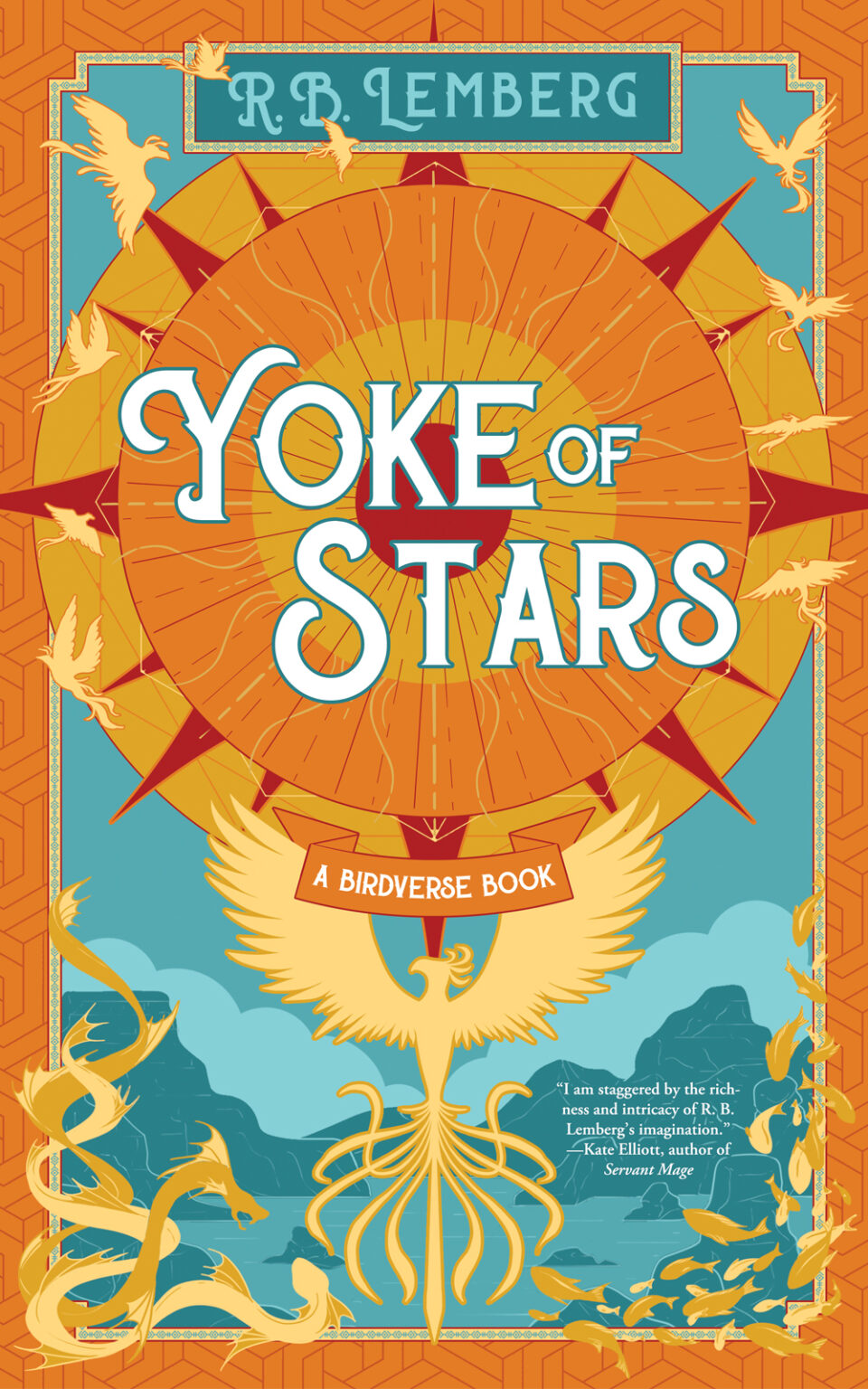Full Disclosure: This book was read as an e-ARC (Advance Reader Copy) obtained via Netgalley from the publisher in advance of the book's release on July 16, 2024 in exchange for a potential review. I give my word that this did not affect my review in any way - if I felt conflicted in any way, I would simply have declined to review the book.
Yoke of Stars is the latest story in R.B. Lemberg's Birdverse world, a world featuring queer characters (sometimes oppressed, sometimes not) and magic based upon "deepnames", whose power depend upon the number of syllables in those names and the number of them possessed by their holder - and whose various permutations can result in different powers and personalities. It's a setting that has produced some remarkable works such as the novella The Four Profound Weaves - in which a pair of older protagonists try to assert their queerness in an anti-queernnorm world - and the short novel The Unbalancing - featuring a queer-friendly setting that dealt with a neurodivergent protagonist, issues of power, duty, romance and consent. I'm oversimplifying both of those works in that one sentence description by the way, they're both very deep and really well written for their short lengths.
Yoke of Stars is largely the stories of two people - Stone Orphan, a siltway (fish-like) woman cast out from her people's collective under the sea under the guidance of the Star of the Shoal and now an assassin under the Orphan Star; and Ulín, a woman with a love of languages who wanted only to learn more about them throughout the world...only to find herself controlled and destroyed by those who supposedly love her. It's a really interesting story dealing with themes of language, translation, control, and freedom, and I'm still thinking about it as I write this review.
Plot Summary:
Stone Orphan is an assassin waiting for their first assignment, when in walks a nameway person - a woman - named Ulín. But instead of naming a target for Stone Orphan to kill, Ulín expresses interest in Stone Orphan themself - how did a Siltway person come to become an assassin? And what can Ulín learn about the Siltway tongue, as part of their fascination with language and translation?
Stone Orphan wants to be outraged by this person, but can't help but enjoy this thing they've missed - conversation with someone else. And so Stone Orphan and Ulín trade stories: stories about how they each wound up here, far from home, so hurt and with torn bonds that are so hard to name....Thoughts: Yoke of Stars focuses upon its two protagonists' stories, who naturally will parallel each other and feature connections neither would guess going in. It's a setup many readers will have seen before, but Lemberg makes it work really well to discuss the themes of this book. First among those is the theme of language (as Lemberg explains in the author's note, she was very intrigued by the idea of a no verb language) and translation and how translation doesn't really keep the same meaning but instead attempts to form a "bridge" between cultures. It's really an interesting idea and comes through well in the contrasting approaches of the two lead characters: Ulín would love to study more and more languages, while Stone Orphan only mourns the loss of their language purity essentially, with the new language they've learned replacing the old one at times in their thought, and them wondering if it will in the end take over from the language without verbs, a language of bonds and connections, that they held at their very core.
Beyond language, Yoke of Stars is the story of bonds and of freedom from control, and how people strive for that freedom even as each Power they live under eventually strives to take it away. Stone Orphan was cast out from the community of the Star of the Shoal for their curiosity and refusal to simply stick to what was....but then instead of finding freedom, found themselves under a different form of control in assassin's house of the Orphan Star. Ulín bounces between the control of her father - who sees her only as a potential heir as long as she has magic - and the dreamway serpent-shifting prince who she thought she loved but instead only used, abused and treated her as a possession to be had (especially for the sake of producing a child). What Ulín and Stone Orphan themselves want is of no consequence to the powers that be, whether those be mortal or those of the godlike Stars, and true freedom lies from escaping and finding one's own destiny as much as possible. Again, Lemberg explains in their author's note that they too escaped a corrupt oppressive soviet government towards queers (like the Dreamway kingdom's) only to now find the US featuring a similar government, and these themes and the story really echo that.
There are some other themes here about power, control, jealousy and forgiveness that deal with characters that I haven't even mentioned in this review as well - Yoke of Stars is very deep for its short length and another easy recommend from Lemberg.

No comments:
Post a Comment